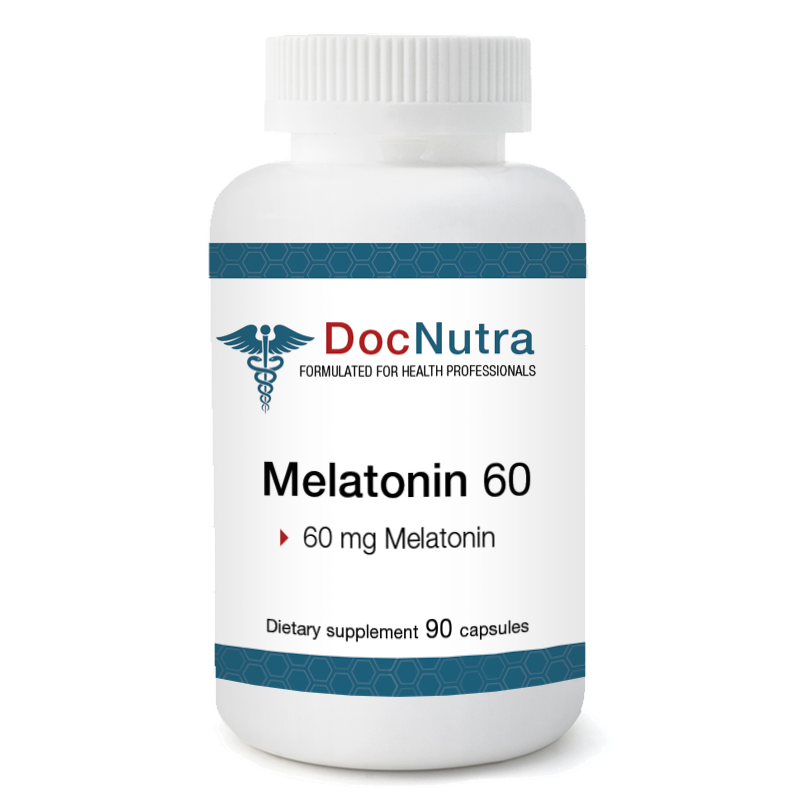Melatonin 60
Melatonin is an endogenous neurohormone primarily produced by the pineal gland and released in response to darkness. It plays a central role in regulating the sleep–wake cycle (circadian rhythm), but its physiological functions extend well beyond sleep regulation. Melatonin exhibits antioxidant, ..
- $34.99
- Quantity Tier Pricing
- 2 or more $26.49
- 12 or more $19.49
Melatonin 60 mg
Overview: Melatonin is an endogenous neurohormone primarily produced by the pineal gland and released in response to darkness. It plays a central role in regulating the sleep–wake cycle (circadian rhythm), but its physiological functions extend well beyond sleep regulation. Melatonin exhibits antioxidant, anti-inflammatory, immunomodulatory, and neuroprotective effects, making it an important molecule for systemic health and cellular balance.
Health Benefits
1. Sleep Regulation and Circadian Rhythm Support
Melatonin synchronizes the body’s internal clock with environmental light–dark cycles, promoting healthy and restorative sleep.
- Improves sleep onset latency and overall sleep quality.
- Aids in circadian rhythm adaptation during shift work, jet lag, or disrupted sleep schedules.
- Supports REM and slow-wave sleep balance, which is critical for tissue repair and cognitive recovery.
Clinical Insight: Supplemental melatonin can be beneficial for individuals experiencing insomnia, delayed sleep phase disorders, or jet lag. Even low physiological doses (0.3–3 mg) effectively promote sleep initiation and rhythm restoration.
2. Antioxidant Protection
Melatonin is a potent free radical scavenger and stimulates the activity of endogenous antioxidant enzymes, including superoxide dismutase (SOD), glutathione peroxidase, and catalase.
- Neutralizes reactive oxygen and nitrogen species.
- Protects mitochondrial function and DNA integrity.
- Reduces oxidative stress linked to aging, neurodegeneration, and inflammation.
Clinical Insight: Due to its amphiphilic nature, melatonin penetrates both lipid and aqueous cellular environments, providing comprehensive cellular protection not achievable with many other antioxidants.
3. Anti-inflammatory and Immunomodulatory Effects
Melatonin modulates immune system activity and downregulates pro-inflammatory cytokines such as IL-6, TNF-α, and NF-κB.
- Balances immune responses, enhancing defense while reducing excessive inflammation.
- Supports immune recovery during chronic stress or infection.
- Promotes healthy inflammatory resolution in musculoskeletal and neurological tissues.
Clinical Insight: Melatonin’s immunoregulatory effects make it valuable in managing inflammation-related conditions and supporting immune balance during periods of oxidative or physiological stress.
4. Neuroprotective and Cognitive Health Support
Melatonin contributes to brain health by reducing oxidative damage and supporting mitochondrial energy metabolism in neural tissue.
- Protects neurons from free radical injury.
- Supports cognitive function and may help preserve memory and focus during aging.
- Aids in the management of neurodegenerative processes through mitochondrial protection and anti-apoptotic signaling.
Clinical Insight: Clinical evidence suggests that melatonin supplementation can improve sleep-dependent memory consolidation and protect against neuroinflammation associated with aging and oxidative stress.
5. Mitochondrial and Cellular Health
Melatonin directly supports mitochondrial efficiency by optimizing the electron transport chain and minimizing oxidative leakage.
- Enhances cellular energy production (ATP synthesis).
- Reduces mitochondrial damage caused by stress or toxins.
- Promotes cellular longevity through improved redox balance.
Clinical Insight: By acting both as a direct antioxidant and a mitochondrial stabilizer, melatonin enhances cellular resilience and may aid in recovery from oxidative or inflammatory insult.
6. Endocrine and Metabolic Regulation
Melatonin interacts with metabolic hormones such as insulin and cortisol, influencing glucose metabolism and stress response.
- Helps regulate circadian secretion of cortisol, supporting adrenal rhythm.
- Improves insulin sensitivity and may contribute to metabolic balance.
- Supports weight regulation through improved sleep–metabolic axis function.
Clinical Insight: Maintaining optimal melatonin cycles through proper sleep hygiene and supplementation supports metabolic health, particularly in individuals exposed to chronic stress or irregular light exposure.
* Please be aware that packaging displayed on our website may vary from your order based on factors such as availability and supplier changes, or to improve the readability of product details.
* These statements have not been evaluated by the Food and Drug Administration. This product is not intended to diagnose, treat, cure, or prevent any disease.
Tags: melatonin ,



